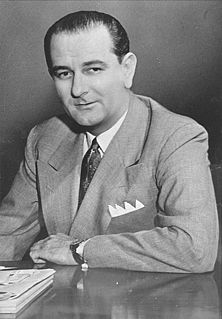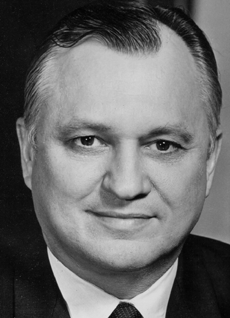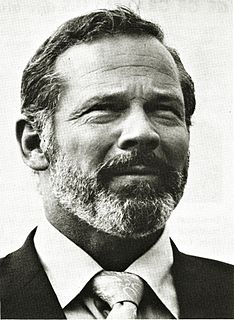
Frank Hughes Murkowski is an American retired politician and a member of the Republican Party. He was a United States senator from Alaska from 1981 until 2002 and the eighth governor of Alaska from 2002 until 2006.

The Alaska Senate is the upper house in the Alaska Legislature, the state legislature of the U.S. state of Alaska. It convenes in the Alaska State Capitol in Juneau, Alaska and is responsible for making laws and confirming or rejecting gubernatorial appointments to the state cabinet, commissions and boards.

The United States Senate elections of 1958 were elections for the United States Senate which occurred in the middle of President Dwight D. Eisenhower's second term. As is common in midterm elections, the party in the White House lost seats, but losses this year were more than usual, perhaps due to the high unemployment of the Recession of 1958. The Eisenhower Administration's position on right-to-work issues galvanized labor unions which supported Democrats. The launch of Sputnik may also have been a factor.

The 2006 Alaska gubernatorial general election took place on November 7, 2006. The former mayor of Wasilla, Sarah Palin, was elected governor.

The California gubernatorial election, 1962 was held on November 6, 1962. The Democratic incumbent, Pat Brown, ran for re-election against former Vice President Richard Nixon. In his concession speech, Nixon accused the media of favoring his opponent Brown, stating that it was his "last press conference" and "You won't have Dick Nixon to kick around any more." Six years later, Nixon was elected President of the United States.

The California gubernatorial election, 1958 took place on November 4, 1958.

The 1998 Alaska gubernatorial general election took place on November 3, 1998. The election resulted in a landslide for the Democratic incumbent, Tony Knowles, who had won the 1994 gubernatorial election by only 536 votes. Knowles was the first incumbent governor to attain re-election since 1978. As of 2019, this is the most recent election in which a Democrat was elected Governor of Alaska and the most recent election in which an Alaskan governor was re-elected.
Political party strength in Alaska has varied over the years. The communities of Juneau, Sitka, downtown and midtown Anchorage, the areas surrounding the College/University of Alaska Fairbanks campus and Ester and the "Alaska Bush" – rural, sparsely populated Alaska – stand out as Democratic strongholds, while the Kenai Peninsula, Matanuska-Susitna Valley, parts of Anchorage, and Fairbanks, Ketchikan, Wrangell, and Petersburg serve as the Republican Party electoral base. As of 2004, well over half of all registered voters have chosen "Non-Partisan" or "Undeclared" as their affiliation, despite recent attempts to close primaries.

The number of elections in Alaska varies by year, but typically municipal elections occur every year, plus primary and general elections for federal and state offices occur during even-numbered years. Alaska has a gubernatorial election every four years. Members of the state's United States congressional delegation run for election or re-election at the times set out in the United States Constitution. Primary elections assist in choosing political parties' nominees for various positions. On a regional basis, elections also cover municipal issues. In addition, a special election can occur at any time.

Hollis S. French II is a Democratic member who served in the Alaska Senate, serving from 2003 to 2015. He was minority leader from January 2014 until he left office. During this time, French authored an unsuccessful bill to strike down the state's same-sex marriage ban.

The 2002 Alaska gubernatorial election took place on November 5, 2002 for the post of Governor of Alaska. Republican U.S. Senator Frank Murkowski defeated Democratic Lieutenant Governor Fran Ulmer. Murkowski became the first Republican elected governor of Alaska since Jay Hammond in 1978.

The 1994 Alaska gubernatorial election took place on November 8, 1994, for the post of Governor of Alaska, United States. Democratic candidate Tony Knowles narrowly defeated Republican candidate Jim Campbell and Lieutenant Governor Jack Coghill of the Alaskan Independence Party. In the Republican Revolution year of the 1994 elections, Alaska's was the only governor's seat in the country to switch from Republican to Democratic.

The 2010 Alaska gubernatorial election took place on November 2, 2010. Former Governor Sarah Palin did not run, having resigned in July 2009. Incumbent Governor Sean Parnell, who as lieutenant governor succeeded Palin following her resignation, announced that he would seek a full term.

The 1990 Alaska gubernatorial election took place on November 6, 1990, for the open seat of Governor of Alaska. In 1989, incumbent Governor Steve Cowper, a Democrat, had announced that he would not seek re-election for a second term.

The 2014 United States Senate election in Alaska took place on November 4, 2014, to elect a member of the United States Senate to represent the State of Alaska, concurrently with the election of the governor of Alaska, as well as other elections to the United States Senate in other states and elections to the United States House of Representatives and various state and local elections.

The 2014 Alaska gubernatorial election took place on November 4, 2014, to elect the governor and lieutenant governor of Alaska, concurrently with the election of Alaska's Class II U.S. Senate seat, as well as other elections to the United States Senate in other states and elections to the United States House of Representatives and various state and local elections.
Jerry Ward is an American politician and businessman.

Mike J. Dunleavy is an American politician who is the 12th governor of Alaska, serving since December 2018. A Republican, Dunleavy was a member of the Alaska Senate from 2013 through 2018. Dunleavy defeated former Democratic United States Senator Mark Begich in the 2018 gubernatorial election.

The 1978 Alaska gubernatorial election took place on November 7, 1978, for the post of governor of Alaska. Republican incumbent Jay Hammond defeated four opponents: former Governor of Alaska and write-in candidate Walter Hickel, Alaska Senator and Democratic nominee Chancy Croft, former Commissioner of Natural Resources and Independent candidate Tom Kelly and Alaskan Independence Party nominee Don Wright. After losing to Hammond in the Republican primary, Hickel ran as a write-in candidate and was able to outperform Croft.

The 2018 Alaska gubernatorial election took place on November 6, 2018, to elect the governor and lieutenant governor of Alaska. In the primaries for recognized political parties, candidates for governor and lieutenant governor run separately. The winners of each respective primary for governor and lieutenant governor then become a joint ticket in the general election for their political party.

















